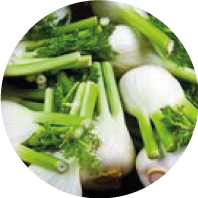Menthol
Menthol is one of the best known and widely used ingredients in natural medicine, famous for relief of minor throat irritation and respiratory inflammation. It has local anesthetic properties.

Pine Oil (Pinus palustris)
For generations, Pine Oil has been valued for its antibacterial, antiviral, and anti-inflammatory effects. In addition to its antiseptic properties, Pine Oil is an expectorant, decongestant, analgesic, diuretic, and energizer. It is used to treat the common cold, cough and bronchitis, fevers, and inflammation of the mouth and throat.
It brings a unique and unforgettable flavor to our lozenges.
Hippocrates, the father of Western medicine, used Pine Oil in the treatment of pulmonary conditions and established its healing effects on the respiratory system. Centuries later, Pine Oil was still being recommended by the ancient physician Pliny for treating respiratory and lung problems.
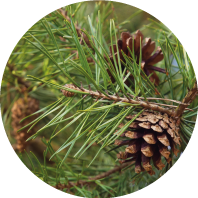
Eucalyptus Leaf (Eucalyptus globulus)
Among the many uses of Eucalyptus Leaf is its ability to boost respiratory health, strengthen the immune system, eliminate inflammation, and fight against bacterial infection. Used for treatment of cough and bronchitis, as well as for asthma, sinuses, and flu.
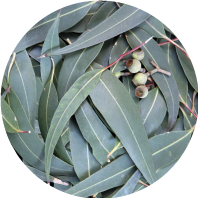
Peppermint (Mentha piperita)
Peppermint is a traditional and still popular folk remedy for a number of health conditions including irritable bowel syndrome, along with related symptoms of diarrhea, gas, nausea, and indigestion. Also used for depression-related anxiety, muscle and nerve pain, and treatment of the common cold.
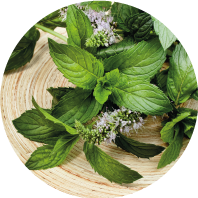
Marigold with calyx (Calendula officinalis)
Added not only for flavor in soups, stews, teas, butter, and cheese, Calendula has been used in medicine, as an antiviral and anti-inflammatory oil, and to soothe and repair irritated tissues. It is used as well on wounds and burns.

Mallow flowers (Malva sylvestris)
Malva sylvestris contains a demulcent – an agent that coats and soothes irritated mucous membranes in the mouth, throat, stomach, and intestines. Traditionally used as an herbal respiratory remedy for asthma, bronchitis, cough, throat infections and emphysema, Mallow also treats wounds.
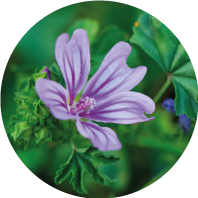
Yarrow flowers (Achillea millefolium)
When taken internally Yarrow is used to treat colds, fevers, and indigestion. It has been shown to stop cramps, relieve inflammation, and relax the muscles. It is known to stimulate the release of stomach acid and bile, which enables digestion of proteins and fats.
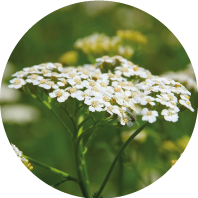
Honey
Honey has a long medicinal history. Holistic practitioners consider it one of nature's best all-around remedies for wound care and cough suppression.
Honey’s health benefits seem limitless, and you can hardly find a more universal healing agent. According to the NIH, Honey possesses potent antibacterial and immunomodulatory benefits.
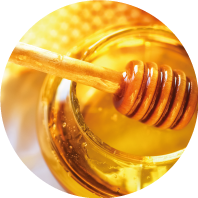
Primrose with calyx (Primula veris)
Primrose is known as an expectorant, to help reduce bronchial irritation and congestion.
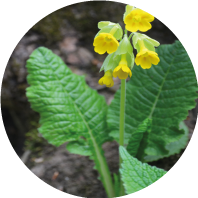
Elderflower (Sambucus nigra)
Elderflower is rich with flavonoids, volatile oils and caffeic acid derivatives. It is used for coughs, bronchitis, fevers and colds. As a sweat producing remedy it is especially helpful in treatment of feverish colds. A combination of these phytochemicals give elderflower its anti-inflammatory, anti-carcinomic and antiviral properties.
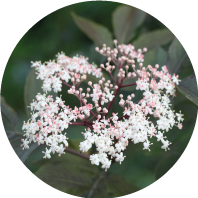
Linden Flower (Tilia sp.)
Linden flower, containing a combination of flavonoids, tannins and glycosides, is often prescribed to treat colds, cough, bronchitis, fever, infections, inflammation, high blood pressure, and migraine headaches. Also used as a diuretic, antispasmodic, and sedative. Peppermint helps improve the immune system, detoxify and calm the body, eliminate anxiety, and lower blood pressure.
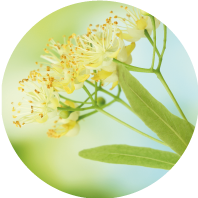
Mullein flowers (Verbascum thapsus)
Mullein flowers, rich in mucin and saponin, have been traditionally used for the management of respiratory disorders, and for asthma, cough, tuberculosis, and related respiratory problems.
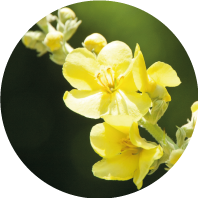
Chamomile flowers (Matricaria recutita)
People have enjoyed Chamomile tea for centuries, not only for its taste, but also for the benefits of flavonoids such as chrysin. Chamomile has long been known for its antimicrobial, gastrointestinal, anti-inflammatory, antioxidant, antineoplastic, and anxiolytic effects. It is used both internally and externally for ordinary coughs and bronchial disorders, fevers and colds, wounds and inflammation of the mouth, throat and skin.
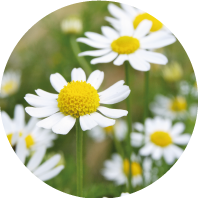
Blackberry Leaf (Rubus fruticosus)
Blackberry is a delicious fruit rich with vitamins and antioxidants, providing multiple health benefits that include relief from inflammation, strengthened immune defense, better digestive health, enhanced functioning of the heart, and improved ocular health and cognition.
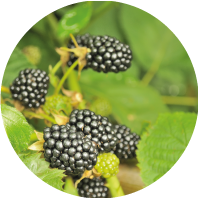
Sage Leaf (Salvia officinalis)
Sage contains a variety of volatile oils, flavonoids (including apigenin, luteolin), phenolic acids (including rosmarinic acid) and triterpenes – all of which work together to act as an antibacterial, fungistatic, virostatic, astringent, decongestant, and perspiration-inhibiting agent. Sage functions as a natural antioxidant.
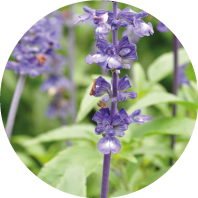
Thyme (Thymus vulgaris)
Thyme essential oil contains thymol and a range of additional compounds, making it a strong antiseptic. It was applied to bandages long before the advent of antibiotics, and as a mouthwash and gargle to treat cough, tonsillitis and persistent wounds.
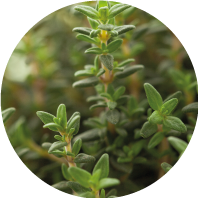
Star Anise (Illicium verum)
Star Anise is the major source of the shikimic acid, a primary precursor in the pharmaceutical synthesis of anti-influenza drug oseltamivir. People take Star Anise for respiratory tract infections, cough, bronchitis, influenza, swine flu, and bird flu. Star Anise is also helpful in treating digestive tract problems, including upset stomach, gas, loss of appetite, and infantile colic.
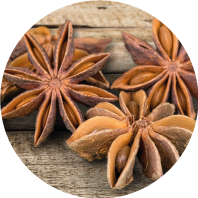
Icelandic Moss (Lichen islandicus)
Icelandic Moss is used for treating irritation of the mouth and throat, loss of appetite, the common cold, dry cough, bronchitis, indigestion, fever, diseases of the lung, kidney and bladder, along with a range of other infections, including persistent skin wounds.
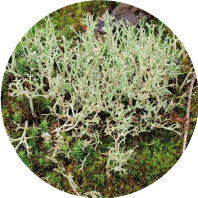
Lungwort (Pulmonaria officinalis)
As its name suggests, Lungwort has been used to treat pulmonary conditions. It has both expectorant and soothing effects (owing to its mucilaginous polysaccharide and tannin content), and it is used in treatment of gastrointestinal disturbances, coughs, and more serious lung conditions.
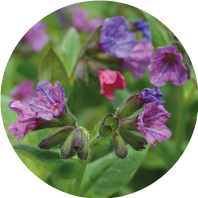
Licorice (Glycyrrhiza glabra)
Besides its use for various digestive system complaints (including stomach ulcers, heartburn, colic, and chronic gastritis), Licorice also treats infections caused by bacteria or viruses, such as sore throat, bronchitis, and cough.
Licorice is used as well for osteoarthritis, liver inflammation, food poisoning, and dehydration.
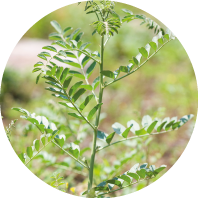
Pimpinella Root (Pimpinella saxifrage)
Burnet Saxifrage is said to have expectorant, anti-inflammatory, antispasmodic and mildly astringent benefits. It is used to dissolve mucus in the airways and to treat the other effects of upper respiratory infections. Pimpinella extract is sometimes used as a gargle to soothe the mouth and throat.
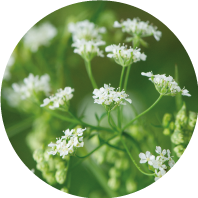
Ribwort Leaf (Plantago lanceolata)
Ribwort is considered an effective herbal remedy, for a wide range of conditions. Research suggests that the leaf is an effective anti-inflammatory and antibacterial agent. It also has astringent properties. A possible wound-healing effect has been mentioned in the literature.
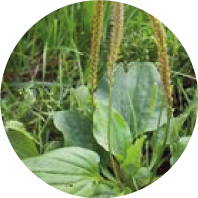
Fennel (Foeniculum vulgare)
Fennel contains a unique combination of flavonoids —chief of which is transanethole, with potent antimicrobial effects against bacteria, yeast, and fungi. Fennel is used for bronchitis and for cough generally, as well as mucosal inflammation and digestive problems.
